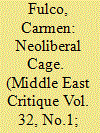| Srl | Item |
| 1 |
ID:
193022


|
|
|
|
|
| Summary/Abstract |
The president of Tunisia, Kais Saied, recurred to Article 80 of the constitution on 25 July 2021 to proclaim the “state of exception,” freezing parliamentary activities, removing the representatives’ immunity, and dissolving the government headed by Prime Minister Hichem Mechichi. The following presidential decree 2021-117 on 22 September granted him legislative powers by decree, dismantling the constitution of 2014, which was the cornerstone of the result of the “Jasmine Revolution” of 2011. This article will analyze the constitutionality of the presidential decrees and shed light on the juridical, socioeconomical, and political circumstances that allowed Saied to perform what can be described as a constitutional coup or a self-coup, which reshaped the future of Tunisia.
|
|
|
|
|
|
|
|
|
|
|
|
|
|
|
|
| 2 |
ID:
191920


|
|
|
|
|
| Summary/Abstract |
On the occasion of Tunisia’s 2019 legislative and presidential elections, politics witnessed the proliferation of distinct varieties of populism that culminated in the electoral victory of the current president, Kais Saied. This article argues that the Kais Saied phenomenon inscribes into a Tunisian ‘populist moment’ that found fertile terrain in the protraction of the socioeconomic crisis and the absence of a radical critique of the neoliberal order. Although Kais Saied proposed an alternative to traditional politics in his electoral campaign, he did not seem likely to shake the foundations on which Tunisia’s neoliberal cage has been built. Rather, an empirical analysis of the context of his ascent suggests that populism à la Kais Saied surfaced as the by-product of an unquestioned neoliberal order, reinforced by the political elite of the post-Arab Uprisings period.
|
|
|
|
|
|
|
|
|
|
|
|
|
|
|
|
| 3 |
ID:
193476


|
|
|
|
|
| Summary/Abstract |
Tunisia was the last surviving democracy to emerge from the Arab Spring, and had recently enacted legislation to combat racial discrimination. But President Kais Saied, since coming to power in a 2019 election, has returned the country to authoritarian rule. He has also rolled back progress on race relations, scapegoating sub-Saharan African migrants for Tunisia’s economic troubles. The failure of previous governments to root out corruption and consolidate the democratic transition with a new socioeconomic pact opened the way for a return to dictatorship.
|
|
|
|
|
|
|
|
|
|
|
|
|
|
|
|